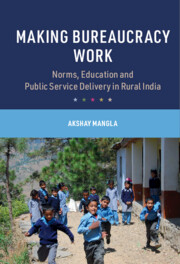Book contents
- Making Bureaucracy Work
- Cambridge Studies in the Comparative Politics of Education
- Making Bureaucracy Work
- Copyright page
- Dedication
- Contents
- Figures
- Tables
- Acknowledgments
- Abbreviations
- Part I Introduction, Puzzles and Theory
- Part II Implementing Primary Education in Northern India
- 4 How Legalistic Bureaucracy Generates Uneven Implementation
- 5 How Deliberative Bureaucracy Facilitates Adaptive Implementation
- 6 Norm Persistence
- 7 Norm Change
- Part III Comparative Extensions and Implications
- Appendix: Researching Bureaucracy and Frontline Public Services
- References
- Index
5 - How Deliberative Bureaucracy Facilitates Adaptive Implementation
from Part II - Implementing Primary Education in Northern India
Published online by Cambridge University Press: 18 November 2022
- Making Bureaucracy Work
- Cambridge Studies in the Comparative Politics of Education
- Making Bureaucracy Work
- Copyright page
- Dedication
- Contents
- Figures
- Tables
- Acknowledgments
- Abbreviations
- Part I Introduction, Puzzles and Theory
- Part II Implementing Primary Education in Northern India
- 4 How Legalistic Bureaucracy Generates Uneven Implementation
- 5 How Deliberative Bureaucracy Facilitates Adaptive Implementation
- 6 Norm Persistence
- 7 Norm Change
- Part III Comparative Extensions and Implications
- Appendix: Researching Bureaucracy and Frontline Public Services
- References
- Index
Summary
Chapter 5 analyzes how deliberative bureaucracy works to produce superior outcomes for primary education through the analysis of implementation in the state of Himachal Pradesh (HP). Notwithstanding its difficult Himalayan geography, subsistence agricultural economy and weak initial conditions, HP has arisen to become one of India's leading states in primary education. Drawing on historical sources and interviews with state officials, I first examine the historical emergence of deliberation in HP, linked to the politics of state-building in the 1970s and 1980s. I then present findings from qualitative field research conducted at the state-, district- and village-levels, demonstrating how deliberative bureaucracy implements primary education across a range of administrative tasks: state planning to expand infrastructure and integrate disadvantaged children, the promotion of women’s participation in the monitoring of schools and, finally, village-level coproduction of primary education services over time.
Keywords
- Type
- Chapter
- Information
- Making Bureaucracy WorkNorms, Education and Public Service Delivery in Rural India, pp. 171 - 218Publisher: Cambridge University PressPrint publication year: 2022

